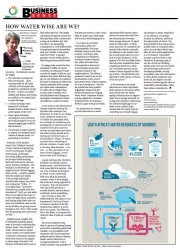Gail Robinson - How water wise are we?2016-06-22 Five Fast Facts on Water Usage:
Simply because roughly 30% of household drinking-quality water is devoted to removing this human 'waste'. This, in light of South Africa's status as a water scarce country, is no small matter. EThekwini's relocation of human waste from source to sea equates to water usage of around 3 650 litres per individual with access to flush toilets per year. This simple calculation is based on around ten litres per flush, with a conservative average of one flush a day. This amounts to an astounding consumption of 7,300 million litres of municipal water by households each year. Further to the answer tothe first 'Why?' is another question: Can we really afford to flush the good away with the bad? We gauge water scarcity by how adequately it fulfils our needs. Currently, our demand for water exceeds the supply. While we can't influence how much falls from the sky; we can influence our demand for water by altering our behaviour. Indeed, especially as the average per capita water consumption in South Africa is higher than in most other countries, we're told that behavioural changes in municipal consumption is where the difference needs to be made. A precursor to this behavioural change would be shifting the attitudes that underpin our behaviour, in order to see things from a different perspective. To enable this paradigm shift, we can begin by examining our assumptions to identify and free ourselves from preconceived notions around water and waste. But what exactly should we be looking at? Well, the logic, or should that be 'illogic', of waterstressed cities continuing to allocate volumes of water daily to moving what amounts - in a year - to the equivalent of one item of hand luggage, clearly needs some fresh looking at. A good starting point, therefore, would be our attitude toward human waste. And with this first look comes the first surprise - that our view of human by-products as 'waste' is not a universally held view; what we generally consider 'waste' is increasingly, the world over, being regarded as a resource. That our discomfort with our bodily products is actually learned, and not shared worldwide, seems astonishing - isn't everyone at least a bit embarrassed by this aspect of our humanness?! Don't we all want to distance ourselves from this (malodorous) subject? It seems that's not a given. The difference lies in the ability to recognise the inherent value of what we consider 'waste'. The second surprise is that there's a process of turning human excreta into something useful (and valuable, I am persuaded!) with minimum risk of environmental pollution and no threat to human health, and it's referred to as 'ecological sanitation'. And it doesn't consume vast quantities of that precious resource, water. That's right, it's water wise, which right now is a fact worth hanging on to. So, in spite of our initial reservations, which are understandable, this route definitely seems worth closer scrutiny. And that is what is underway at eThekwini's Newlands-Mashu Research Site, where the waste from 85 households is directed to a decentralised waste water treatment system in the neighbourhood. The effluent produced is used in an on-site permaculture centre, and in agricultural trials, where its impact on crops is monitored - thus far the results have been positive. In addition, sludge from pit latrines (treated at the Tongaat Waste Water Treatment Works) is being supplied in odourless, 'pelletised'form, for testing as fertilizer, again with good results. The motivation for coming up with alternatives to waterdependent flush systems seems obvious for areas that don't have the infrastructure for waterborne sewage disposal. Or piped water, for that matter. In these areas, however, for example in the Inanda valley (which, ironically, lies adjacent to the Inanda Dam - the second largest dam in KZN) lack of social acceptance of the upward of 80 000 non-flush toilets that have been installed has been a significant deterrent to their use. The salient question in the minds of those targeted for their use is often, "Would these be the alternative toilet option, of choice, of the non-poor?" Is the motivation for using alternatives to water-dependent flush systems as obvious in urban areas which have the (albeit, ageing) infrastructure to support water-borne sewage disposal? As a long-term solution to addressing the demand/supply gap in our water-scarce country, logic dictates that this surely must be something we seriously engage, and prepare to adopt. Regardless of our affluence. Or perhaps because our affluence affords us the opportunity of choice. The deep realisation that using scarce, potable water, to transport miles out to sea a product which may, after all, have useful applications, is a 'no-brainer'. Particularly as water scarcity is here to stay. Should we be getting ready to say: let's drink our drinking quality water; let's use innovation and technology and invest in developing sensible, sociallyacceptable, water-wise alternatives to water-borne sanitation; and above all, let's begin to see the wisdom of embracing the ethos of sustainable custodianship, rather than witless consumption. Gail Robinson, Freelance writer and researcher, MA Population Studies (cum laude) gailsusanrobinson@gmail.com References: www.wrc.org.za www.issafrica.org www.actionaid.org/Water efficiency report www.prg.ukzn.ac.za/field-sites/newlandsmashu-research-site |
Gail Robinson - How water wise are we?
Copyright © 2024 KwaZulu-Natal Top Business
